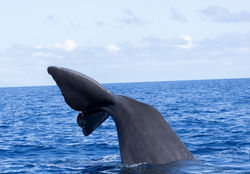
PROJECT CETI
For more details on PROJECT CETI, please see our Project Website and YouTube channel
Bringing together scientists from around the world, Project CETI is using advances in AI to interpret the language of sperm whales. By shedding light on the intricate and intelligent communication of whales, the project not only aims to accelerate conservation efforts, but has the potential to transform the way we understand our relationship with the natural world.
The Harvard Microrobotics Laboratory is collaborating with representatives from around the world, including Google Research, the Government of the Commonwealth of Dominica, MIT, National Geographic Society, and the University of Haifa.

Approach
We are developing innovative tags and deployment mechanisms to record whale behavior along the coast of Dominica. These tag gently adhere to the whales using biomimetic suction cups to collect audio, depth, light, GPS, and other data before autonomously detaching for collection.

Describe your image


Describe your image
Adhesion
One of the traditional major limitations to data collection is the length of adhesion. We extend this time by utilizing biomimicry to continuously improve our suction cup designs. As of our January 2022 expedition, tags remained attached to whales for as long as 17.5 hours.
Drones? Other engineering challenges?
text
 |  |  |  |
|---|---|---|---|
 |  |
Travel
Known as "the Nature Island of the Caribbean," Dominica hosts beautiful beaches, coastal hydrothermal vents, extensive jungle, mangrove forests, waterfalls, and more. When the whales and the weather aren't cooperating, it's time to explore!
 |  |  |  |
|---|---|---|---|
 |
All Videos
All Videos


